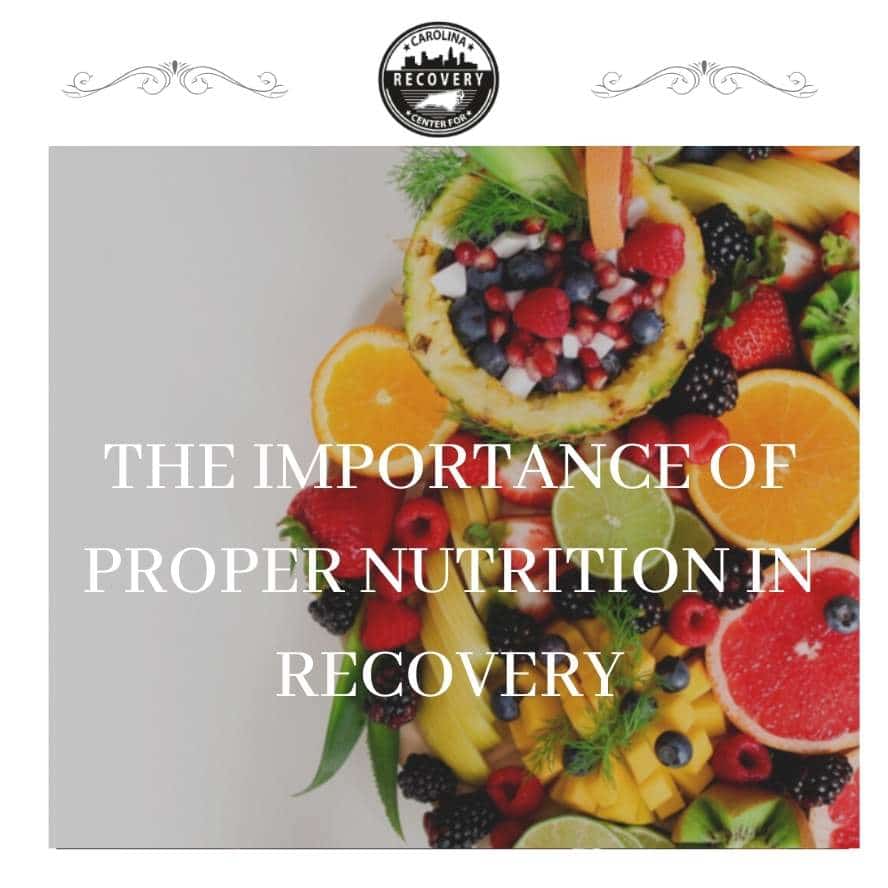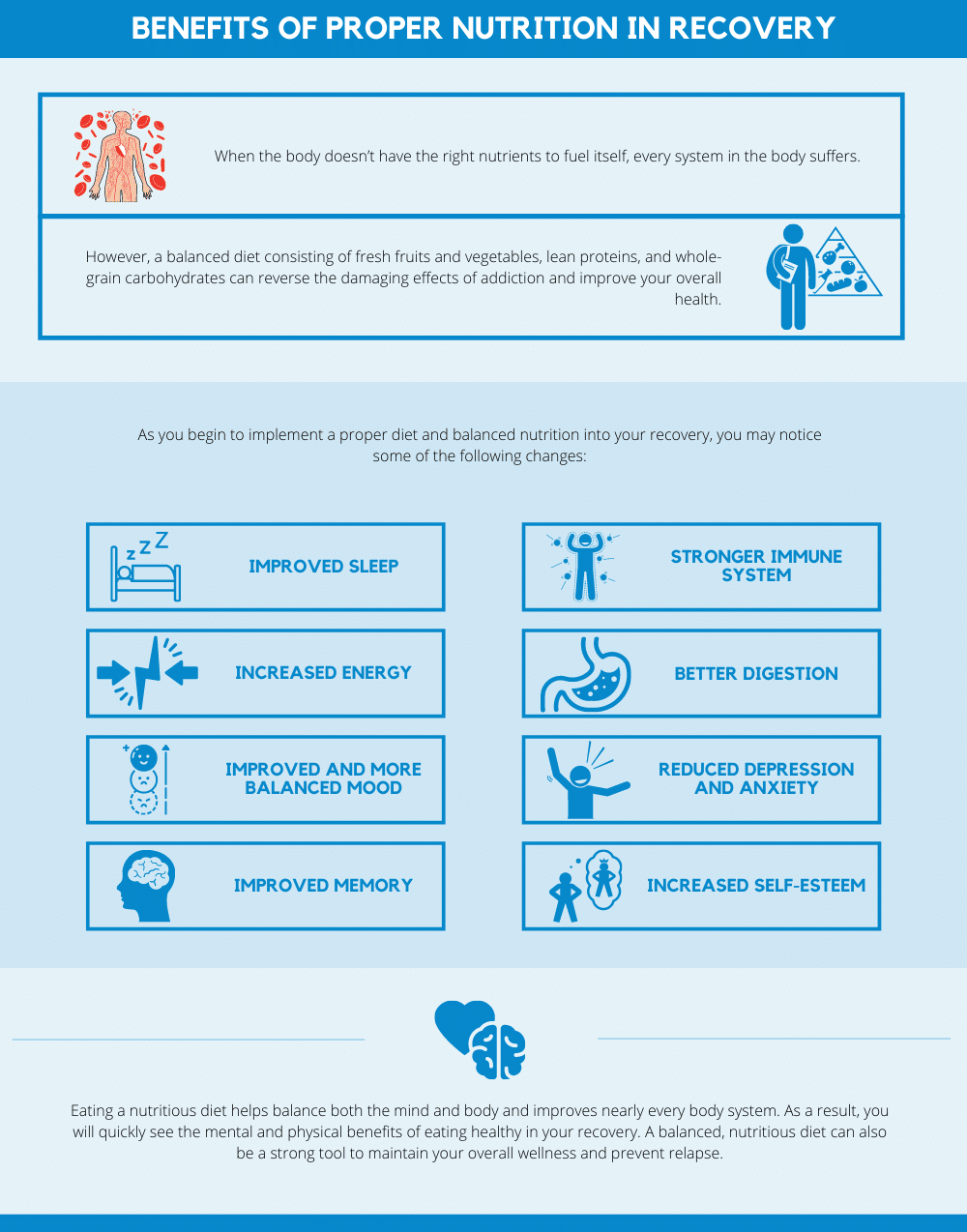The Importance of Proper Nutrition in Recovery

Medically Verified: 2/1/24
Medical Reviewer
Chief Editor

All of the information on this page has been reviewed and verified by a certified addiction professional.
Drug and alcohol abuse affects more than just your social and work life. It can also change your outer appearance, slow down your metabolism, impair your organ function, and make your mental health decline. Having proper nutrition in recovery and eating a healthy diet can help your mind and body get back to functioning at an optimal level.
The Effects of Addiction on Nutrition and Diet
When stuck in the grips of active addiction, it’s likely that you put your addiction in front of everything else – including your diet and nutrition. Rather than putting energy into a healthy lifestyle and spending time preparing nutritious meals, you were probably more focused on buying, using, and recovering from the effects of drugs or alcohol.
There are many ways that addiction can affect your nutrition and diet. The most common destructive food-related behaviors that people with addiction experience include:[1]
- Not eating enough or eating poorly – If you are like many other addicts, you may have spent all of your money on alcohol or drugs, leaving little left over for food. As a result, you may have chosen cheaper, unhealthy options or failed to eat enough to fuel and nourish your body.
- Not eating at all – Some drugs, like meth and cocaine, reduce appetite. Others, like alcohol or opioids, may make you forget to eat while high. Regardless, it’s not uncommon for addicts and alcoholics to go without food for short periods of time.
- Binging – When intoxicated or when coming down from a high, some people may gain a huge appetite and binge eat until they are uncomfortably full.
The Effects of Addiction and Poor Diet on the Mind and Body
Addiction and poor nutrition can wreak havoc on the mind and body, injuring and impairing several vital body functions.
Long-term substance abuse and malnutrition can lead to:[2]
- Depression
- Poor immune system
- Vitamin deficiencies
- Muscle weakness and loss
- Inconsistent heart rate
- Reduced body temperature
- Imbalanced electrolytes
Unfortunately, this list is only the beginning. Many of the effects of addiction and poor diet on the mind and body depend on which substance is being abused. Consider the following effects of different types of addictions and malnutrition:
- Alcohol addiction – Alcohol damages nearly every vital organ in the body, including the digestive system. Alcoholism has proven links to vitamin deficiencies, diabetes, hormonal imbalances, pancreatitis, memory loss, and more.[3]
- Opioid addiction – Many people who abuse opioids report suffering from chronic constipation due to the side effects of opioids. Some opioid users will use laxatives to try and have a bowel movement. However, doing so can worsen the problem by leading to vomiting, heartburn, and other gastrointestinal problems.[4]
- Stimulant addiction – Stimulants, in particular, are famous for their appetite-suppressing properties. This can lead to dehydration, vitamin deficiencies, and malnutrition. Long-term side effects of these implications, combined with substance abuse, can lead to a number of problems, including tooth decay, sores on the arms, hair loss, and rapid weight loss.[5]
The good news is that many of the damages caused by poor nutrition and addiction can be reversed by implementing a healthy diet and proper nutrition in recovery.
Nutritional Counseling in Addiction Treatment
For maximum benefit, nutritional counseling should be offered throughout all stages of the treatment process – starting with detox. Even though you may not have an appetite while detoxing, staying hydrated and consuming a balanced diet will help improve your symptoms and ensure your safety during detox. Proper nutrition can also help balance your mood and give you the extra boost you need to get through drug and alcohol withdrawal.
Then, throughout the course of treatment, it’s important to continue eating a healthy diet so you can establish the healthy habit of preparing nutritious meals. Once this habit is established, you can continue fueling your body with the right vitamins and nutrients it needs in your recovery.
If you aren’t sure how to eat right or how to prepare nutritional meals, most addiction treatment centers offer nutritional counseling. You may have the opportunity to work one-on-one with a nutritionist to develop a meal plan and learn effective tips that will help you maintain a healthy diet.
Some suggestions that may be made to you in regards to your diet in recovery include:
- Be careful of how much sugar you consume
- Eat on a regular schedule to keep your blood sugar levels normal
- Increase your fiber and protein intake
- Incorporate at least 30 minutes of daily exercise into your routine
- Reduce your caffeine intake
- Avoid fast foods or processed foods
- Consume plenty of complex carbohydrates
- Drink water to stay hydrated
Benefits of Proper Nutrition in Recovery

When the body doesn’t have the right nutrients to fuel itself, every system in the body suffers. However, a balanced diet consisting of fresh fruits and vegetables, lean proteins, and whole-grain carbohydrates can reverse the damaging effects of addiction and improve your overall health.
As you begin to implement a proper diet and balanced nutrition into your recovery, you may notice some of the following changes:[6]
- Improved sleep
- Increased energy
- Improved and more balanced mood
- Improved memory
- Stronger immune system
- Better digestion
- Reduced depression and anxiety
- Increased self-esteem
Eating a nutritious diet helps balance both the mind and body and improves nearly every body system. As a result, you will quickly see the mental and physical benefits of eating healthy in your recovery. A balanced, nutritious diet can also be a strong tool to maintain your overall wellness and prevent relapse.
Find Help Today
When trying to overcome an obstacle as large as drug or alcohol addiction, achieving a healthy and balanced diet in recovery may seem insignificant. In reality, poor nutrition in recovery can hold you back from experiencing the full joy of sobriety.
At Carolina Center for Recovery, we don’t just address the basics like detox and behavioral therapy. We also introduce you to life-skills, like nutritional counseling, that will benefit you throughout your recovery.
To learn more about our treatment programs or to enroll in a drug rehab near you, give one of our dedicated treatment professionals a call today.
References:
- https://academic.oup.com/nutritionreviews/advance-article/doi/10.1093/nutrit/nuaa095/5911317
- https://www.ncbi.nlm.nih.gov/pmc/articles/PMC4951875/
- https://pubs.niaaa.nih.gov/publications/arh27-3/220-231.htm
- https://www.ncbi.nlm.nih.gov/books/NBK493184/
- https://www.ncbi.nlm.nih.gov/pmc/articles/PMC4843092/
- https://www.health.harvard.edu/blog/nutritional-psychiatry-your-brain-on-food-201511168626

